Hickson Compact Group
A Hickson Compact Group (abbreviation: HCG) is a collection of galaxies designated as published by Paul Hickson in 1982.[1]
| Alternative names | Hickson Galaxy Groups |
|---|---|
| Survey type | astronomical catalog |
| Target | galaxy |
| Named after | Paul Hickson |
The most famous group on Hickson's list of 100 objects is HCG 92, Stephan's Quintet.
Hickson Compact Groups
According to Hickson: “Most compact groups contain a high fraction of galaxies having morphological or kinematical peculiarities, nuclear radio and infrared emission, and starburst or active galactic nuclei (AGN) activity. They contain large quantities of diffuse gas and are dynamically dominated by dark matter. They most likely form as subsystems within looser associations and evolve by gravitational processes. Strong galaxy interactions result and merging is expected to lead to the ultimate demise of the group. Compact groups are surprisingly numerous, and may play a significant role in galaxy evolution.”[2]
List
| Image | HCG | Right ascension[3] | Declination[3] | Galaxy count[4] | Members | Notes |
|---|---|---|---|---|---|---|
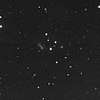 |
1 | 00h 26.0m | +25° 43′ | 4 | UGC 248, PGC 1625, PGC 1614, PGC 1618 | |
| 2 | 00h 31m 24s | +08° 26.8′ | 4 | UGC 312, Markarian 552, UGC 314, UGC 315 | ||
| 3 | 00h 34m 11s | −07° 35.6′ | 4 | MCG-01-02-032, PGC 2064, PGC 2059, PGC 2043 | ||
| 4 | 00h 34m 15.3s | −21° 26′ 52″ | 5 | ESO 540-1, ESO 540-2, PGC 2051, PGC 2057, PGC 2040 | ||
| 5 | 00h 38m 54s | +07° 03.8′ | 4 | NGC 190, NGC 190S, MCG+01-02-042, PGC 2326 | ||
| 6 | 00h 39m 10s | −08° 23.7′ | 4 | |||
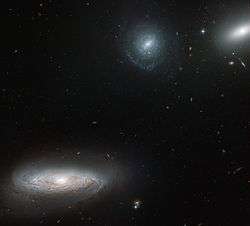 |
7 | 00h 39m 15.9s | +00° 53′ 17″ | 4 | NGC 192, NGC 196, NGC 197, NGC 201 | Contains three spirals and one lenticular galaxy[5] |
| 8 | 00h 49m 37s | +23° 34.8′ | 4 | |||
| 9 | 00h 54m 18s | −23° 33.1′ | 4 | |||
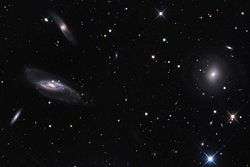 |
10 | 01h 26m 24.5s | +34° 42′ 51″ | 4 | NGC 536, NGC 529, NGC 531, NGC 542 | |
| 11 | 01h 26.6m | −23° 13′ | 4 | |||
| 12 | 01h 27m 33.7s | −04° 40′ 14″ | 5 | |||
| 13 | 01h 32.4m | −07° 52′ | 5 | |||
| 14 | 01h 59m 47s | −07° 01.7′ | 4 | |||
| 15 | 02h 07m 39.0s | +02° 08′ 18″ | 6 | |||
 |
16 | 02h 09m 31.3s | −10° 09′ 31″ | 4 | NGC 835, NGC 833, NGC 838, NGC 839 | Contains three starburst galaxies, two LINER galaxies, and a Seyfert 2 galaxy[6] |
| 17 | 02h 14m 04.5s | +13° 18′ 54″ | 5 | |||
| 18 | 02h 39m 06.10s | +18° 23′ 02.0″ | 4 | |||
| 19 | 02h 42m 45s | −12° 24.7′ | 4 | |||
| 20 | 02h 44m 14s | +26° 06.2′ | 6 | |||
| 21 | 02h 45m 16.9s | −17° 37′ 35″ | 5 | NGC 1099, NGC 1100, NGC 1098, NGC 1091, NGC 1092 | ||
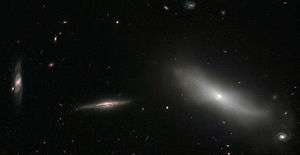 |
22 | 03h 03m 31s | −15° 40.5′ | 5 | NGC 1199, NGC 1190, NGC 1189, NGC 1191, NGC 1192 | |
| 23 | 03h 07m 06s | −09° 35.1′ | 5 | NGC 1214, NGC 1215, NGC 1216, MCG-02-08-054 | ||
| 24 | 03h 20.3m | −10° 51′ | 4 | |||
| 25 | 03h 20m 43.7s | −01° 03′ 07″ | 7 | |||
| 26 | 03h 21m 54s | −13° 38.8′ | 4 | |||
| 27 | 04h 19.4m | −11° 42′ | 5 | |||
| 28 | 04h 27m 19s | −10° 19.0′ | 4 | |||
| 29 | 04h 34m 45s | −30° 32.8′ | 4 | |||
| 30 | 04h 36.5m | −02° 49′ | 4 | |||
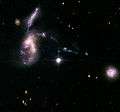 |
31 | 05h 01m 37s | −04° 15.4′ | 4 | NGC 1741A, PGC 16570, NGC 1741B, PGC 16571 | |
| 32 | 05h 01.7m | −15° 25′ | 4 | |||
| 33 | 05h 10m 47.6s | +18° 01′ 11″ | 4 | |||
| 34 | 05h 21m 47s | +06° 40.6′ | 4 | NGC 1875, VV 169b, VV 169c, VV 169d | ||
| 35 | 08h 45m 20.71s | +44° 32′ 23.1″ | 6 | |||
| 36 | 09h 09m 24s | +15° 47.7′ | 4 | |||
| 37 | 09h 13m 35.6s | +30° 00′ 51″ | 5 | |||
| 38 | 09h 27.6m | +12° 16′ | 4 | |||
| 39 | 09h 29m 28s | −01° 20.7′ | 4 | |||
| 40 | 09h 38m 54s | −04° 51.1′ | 6 | |||
| 41 | 09h 57m 40s | +45° 14.4′ | 4 | |||
| 42 | 10h 00m 13.1s | −19° 38′ 24″ | 4 | |||
| 43 | 10h 11.2m | −00° 01′ | 5 | |||
 |
44 | 10h 18m 00s | +21° 48.7′ | 4 | NGC 3185, NGC 3187, NGC 3190, NGC 3193 | |
| 45 | 10h 19.2m | +59° 06′ | 4 | |||
| 46 | 10h 22.0m | +17° 48′ | 4 | |||
| 47 | 10h 25m 48s | +13° 43.9′ | 4 | |||
| 48 | 10h 37m 45.6s | −27° 04′ 50″ | 4 | |||
| 49 | 10h 56m 36s | +67° 10.8′ | 4 | |||
| 50 | 11h 17m 06s | +54° 55.1′ | 5 | |||
| 51 | 11h 22m 21.6s | +24° 19′ 41″ | 6 | |||
| 52 | 11h 26.3m | +21° 05′ | 4 | |||
| 53 | 11h 28m 58s | +20° 46.6′ | 4 | |||
| 54 | 11h 29m 15s | +20° 34.7′ | 4 | |||
| 55 | 11h 32m 07s | +70° 48.7′ | 5 | |||
| 56 | 11h 32m 32s | +52° 56.9′ | 5 | |||
 |
57 | 11h 37m 50.5s | +21° 59′ 06″ | 8 | NGC 3753, NGC 3746, NGC 3750, NGC 3754, NGC 3748, NGC 3751, NGC 3745, PGC 36010 | Also known as Copeland's Septet |
| 58 | 11h 42m 09.4s | +10° 16′ 30″ | 5 | |||
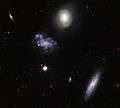 |
59 | 11h 48m 27s | +12° 43.0′ | 5 | IC 737, IC 736, PGC 36871, PGC 36867, PGC 36851 | |
| 60 | 12h 03m 05s | +51° 41.6′ | 4 | |||
 |
61 | 12h 12m 24s | +29° 10.7′ | 4 | NGC 4169, NGC 4170, NGC 4174, NGC 4175 | |
| 62 | 12h 53m 05.6s | −09° 12′ 21″ | 4 | |||
| 63 | 13h 02.2m | −32° 46′ | 4 | |||
| 64 | 13h 25m 43s | −03° 51.5′ | 4 | |||
| 65 | 13h 29m 53s | −29° 30.0′ | 5 | |||
| 66 | 13h 38m 33s | +57° 18.3′ | 4 | |||
| 67 | 13h 49m 03.5s | −07° 12′ 20″ | 4 | |||
| 68 | 13h 53m 40.9s | +40° 19′ 07″ | 5 | |||
| 69 | 13h 55m 31s | +25° 03.8′ | 4 | |||
| 70 | 14h 04m 07.4s | +33° 19′ 10″ | 6 | |||
| 71 | 14h 11.1m | +25° 29′ | 4 | |||
| 72 | 14h 47m 55s | +19° 03.6′ | 5 | |||
| 73 | 15h 02m 40.1s | +23° 21′ 13″ | 5 | |||
| 74 | 15h 19m 28s | +20° 53.6′ | 5 | |||
| 75 | 15h 21m 37.0s | +21° 10′ 50″ | 6 | |||
| 76 | 15h 31.7m | +07° 18′ | 5 | |||
| 77 | 15h 49m 17s | +21° 49.7′ | 4 | |||
| 78 | 15h 48.5m | +68° 12′ | 4 | |||
 |
79 | 15h 59m 13s | +20° 45.1′ | 5 | NGC 6027, NGC 6027a, NGC 6027b, NGC 6027c, NGC 6027d, NGC 6027e (tidal tail of NGC 6027) | Also known as UGC 10116, VV 115, Seyfert's Sextet or Serpens Sextet. Contains 2 lenticular galaxies, 3 spiral galaxies (one barred spiral) and a tidal tail. |
| 80 | 15h 59m 12s | +65° 13.6′ | 4 | |||
| 81 | 16h 18m 13s | +12° 47.6′ | 4 | |||
| 82 | 16h 28m 22.1s | +32° 49′ 25″ | 4 | |||
| 83 | 16h 35m 40.9s | +06° 16′ 12″ | 4 | |||
| 84 | 16h 44m 08s | +77° 50.2′ | 6 | |||
| 85 | 18h 50m 22.3s | +73° 21′ 00″ | 4 | |||
| 86 | 19h 51m 59.2s | −30° 49′ 34″ | 4 | |||
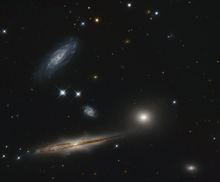 |
87 | 20h 48m 11s | −19° 50.4′ | 4 | ESO 597-36, PGC 65409, ESO 597-35, PGC 65414 | One of the most compact groups, hosting two active galactic nuclei and a starburst among its three members, all of which show signs of interaction |
| 88 | 20h 52.4m | −05° 45′ | 4 | |||
| 89 | 21h 20.2m | −03° 54′ | 4 | |||
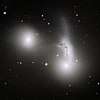 |
90 | 22h 02m 06.3s | −31° 55′ 48″ | 4 | NGC 7173, NCG 7174, and NGC 7176 | |
| 91 | 22h 09m 00.8s | −27° 47′ 36″ | 4 | |||
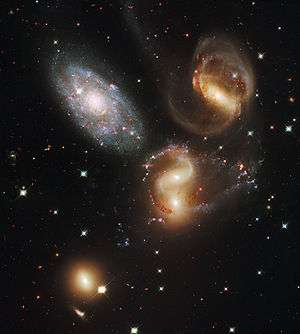 |
92 | 22h 35m 57.5s | +33° 57′ 36″ | 5 | NGC 7317, NGC 7318A, NGC 7318B, NGC 7319, NGC 7320C | Also called Stephan's Quintet, one galaxy of the sixsome, NGC 7320, is not part of the HCG but is a foreground galaxy in front of the five galaxies in the HCG. When discovered, two of the galaxies in the grouping were considered to be one galaxy, NGC 7318. |
| 93 | 23h 15m 12.2s | +18° 59′ 31″ | 5 | |||
| 94 | 23h 17m 16.5s | +18° 43′ 11″ | 7 | |||
| 95 | 23h 19m 32s | +09° 29.5′ | 4 | |||
.jpg) |
96 | 23h 27m 58s | +08° 46.4′ | 4 | NGC 7674, NGC 7674A, NGC 7675, PGC 71507 | |
| 97 | 23h 47m 24.0s | −02° 19′ 08″ | 5 | |||
| 98 | 23h 54.2m | +00° 22′ | 4 | |||
| 99 | 00h 00m 43s | +28° 23.7′ | 4 | |||
| 100 | 00h 01.3m | +13° 07′ | 4 | |||
Gallery
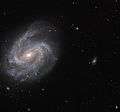

 Hickson Compact Group 59 by Hubble Space Telescope
Hickson Compact Group 59 by Hubble Space Telescope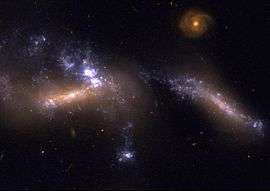 HCG 31 by Hubble Space Telescope
HCG 31 by Hubble Space Telescope HCG 31
HCG 31 The four members of HCG 44 by Hunter Wilson
The four members of HCG 44 by Hunter Wilson
See also
| Wikimedia Commons has media related to Hickson Compact Group. |
References
- Hickson, Paul (1982). "Systematic properties of compact groups of galaxies". Astrophysical Journal. 255: 382–391. Bibcode:1982ApJ...255..382H. doi:10.1086/159838.
- "Compact Groups of Galaxies". Retrieved 23 October 2006.
- "HCG". SIMBAD. Centre de données astronomiques de Strasbourg. Retrieved 8 March 2017.
- Hickson, P. (1982). "Systematic properties of compact groups of galaxies". Astrophysical Journal. 255: Part 1, 382–391. Bibcode:1982ApJ...255..382H. doi:10.1086/159838.
- "Anne's Picture of the Day: Hickson Compact Group 7". Anne's Astronomy News. 27 December 2012.
- "Hubble views a bizarre cosmic quartet". Space Daily. 22 June 2015.
- "A fossil in the making". ESA/Hubble Picture of the Week. Retrieved 3 July 2014.
- "A members-only galaxy club". ESA/Hubble Picture of the Week. Retrieved 10 December 2013.
Further reading
- Paul Hickson (15 April 1982). "Systematic properties of compact groups of galaxies". Astrophysical Journal, Part 1. 255: 382–391. Bibcode:1982ApJ...255..382H. doi:10.1086/159838.
- Paul Hickson (25 October 1997). "Compact Groups of Galaxies". Annual Review of Astronomy and Astrophysics. 35: 357–388. arXiv:astro-ph/9710289. Bibcode:1997ARA&A..35..357H. doi:10.1146/annurev.astro.35.1.357.
External links
- Astronomy Picture of the Day – Galaxy Group Hickson 31 – 22 February 2010